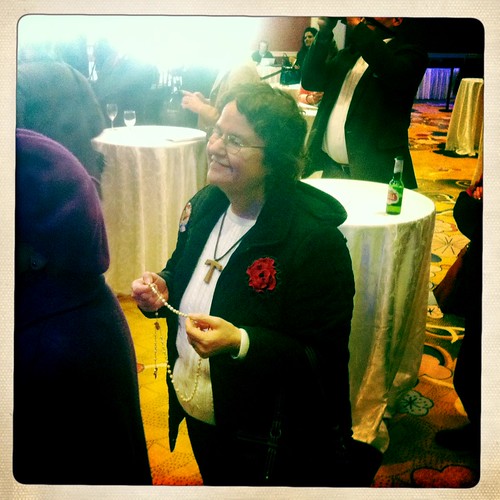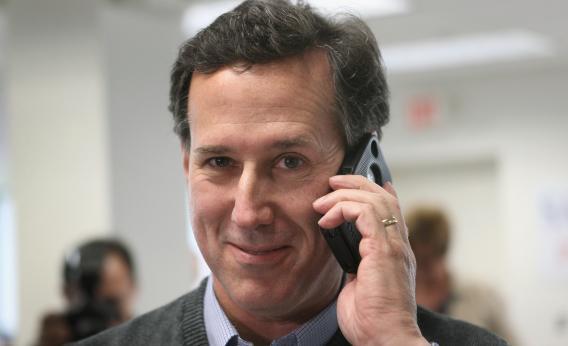GRAND RAPIDS, Mich. – The Amway Grand Plaza Hotel occupies prime real estate here, on the bank of the rapids, nestled near the Gerald Ford Presidential Museum. I have tucked in for the night with a classy selection of national reporters, newly kept away from actual voting humans by a hardy secret service detail.
Here’s what will happen. At 8 p.m. ET, all but four counties in Michigan close their polls, and counting begins. At 8:30, the largest (yet still incompete) wave of exit polls comes in. At 9 p.m., Arizona polls close and every last poll in Michigan closes. Very soon after that, expect Arizona to be called for Mitt Romney.
The numbers and letters at the top of this page are not jokes. A smart Republican pollster friend, who’s confirmed that the Democrats-for-Santorum trend is real, confidentally claims that Santorum will win Michigan if the D vote hits 12 percent. The letters stand for Oakland and Macomb counties, where, in 2008, Mitt Romney won by 20 points and locked up a 9-point statewide win. He can afford mediocre numbers in the rest of the state if he pulls those numbers again.
8:56: Santorum spokeswoman Alice Stewart, a veteran of Michele Bachmann’s campaign, tells me that the race is “all about delegates.” This means that 1) Romney won Michigan and 2) Santorum will keep his net delegate win down to low double digits, or lower.
9:00: As expected, Mitt Romney wins Arizona. The margin doesn’t matter: He gets all 29 delegates. Jan Brewer becomes the first Romney-endorsing governor to watch her guy actually win her state.
9:08: What do you have for us, o exit polls?
- After all that hype, Democrats make up only 9 percent of the electorate. They made up 7 percent in 2008, and 17 percent in 2000. A smart Republican pollster told me that Santorum would win if the Democratic vote hit 12 percent; he still looks smart!
- 44 percent of votes approve of the auto bailout – and they break for Mitt Romney, 41-38 over Santorum. The thing here is that Santorum also opposed the auto bailout, but finessed the difference by saying he was opposed to “all bailouts,” while Romney was mushy about TARP.
And then there’s this number.

9:27: I’m calling it: Mitt Romney wins the Michigan primary. Why am I so sure? He’s winning the Detroit metro area, which casts around a third of the vote, by only slightly less than he won it in 2008. In Oakland he’s holding at a 16-point margin. He’s doing well enough everywhere else to keep Santorum’s margin down. Expect a 3-point overall Romney win.
What does that mean vis-a-vis delegates? Santorum is performing incredibly well in western Michigan and is on track to win the upper peninsula – at least four congressional districts, and their delegates, are his.
9:49: The mood in the Santorum party is… churchlike. A little bit of conversation. Not much attention paid to a well-stocked bar. And the room isn’t full, either. As the numbers look grimmer, TV screens that had been playing Fox News are pulling up, out of view. They come back down and play imagery from the campaign trail soundtracked to Randy Newman’s theme from The Natural.
 10:23: Santorum speaks, and leads off with some talk about his strong-willed mother. It’s not new. He dropped a reference to her in a weekend speech in Davison, challenging the liberals who think it’s a misogynist to explain why his mother worked, and “made more than my dad.”
10:23: Santorum speaks, and leads off with some talk about his strong-willed mother. It’s not new. He dropped a reference to her in a weekend speech in Davison, challenging the liberals who think it’s a misogynist to explain why his mother worked, and “made more than my dad.”
10:38: There’s some joy amid the ruins. During the speech I focused on Mary Lou Harig, a supporter who wore a St. Francis cross and fingered her rosary beads as Santorum spoke.
 “I’m inspired by this man,” said Harig, a retired nurse and English teacher. “This is a critical election, too. A third of the hospitals in this country are Catholic hospitals. If we don’t reverse what Obama’s done, in four years people will walk into hospitals and be unable to get care.”
“I’m inspired by this man,” said Harig, a retired nurse and English teacher. “This is a critical election, too. A third of the hospitals in this country are Catholic hospitals. If we don’t reverse what Obama’s done, in four years people will walk into hospitals and be unable to get care.”
10:43: Also in the room: Maggie Gallagher, the founder of the National Organization for Marriage, and Brian Burch, one of the founders of Catholic Vote. Gallagher was on the Susan B. Anthony List’s bus tour of Michigan, stumping for Santorum. Burch’s group bought radio ads and made 120,000 phone calls to voters. And… well, Mitt Romney had defeated Rick Santorum among Catholics. What did these guys need to do to win?
“We can make it clear that Santorum, not Romney, can be trusted to undo Barack Obama’s assault on the conscience clause,” said Burch.
“I know that ‘moral victory’ is a cliche,” said Gallagher, “but that’s what this was.”
11:22: As the votes rolled in, Santorum’s longtime political strategist John Brabender took a seat next to reporters and started spinning. (ABC’s Jonathan Karl was largely responsible for this.) There was a Santorum victory here, if reporters decided to notice it.
“Right now we’re told that we’re ahead in nine districts,” he said. “It’s possible that we’ll win on delegates here.” What had Romney achieved, anyway? Think about it, reporters.
“God bless ‘em,” said Brabender, “for spending a fabulous amount of money in the candidate’s home state to walk away with fewer delegates than anyone thought humanly possible a few weeks ago.”
Santorum’s brian urged reporters to look at the map. “We’re ahead in Oklahoma. We’re in second place in Georgia, ahead of Romney.” It was a delegate game now, which meant that Santorum could win it.
One problem with this optimism. So, Santorum had done well in the final week. Romney had padded his lead with absentee votes; without them, maybe he would have lost. But among voters who only decided at the polls, Romney beat Santorum. Why?
“It could be better turnout model,” Brabender said. “It could be a number of things.” The campaign was more organized in more places than it had ever been. But as Michigan revealed, it was still behind.
The Arizona/Michigan Primary Thread, Brought to You By the Letters “O” and “M” and the Number “12”

Advertisement